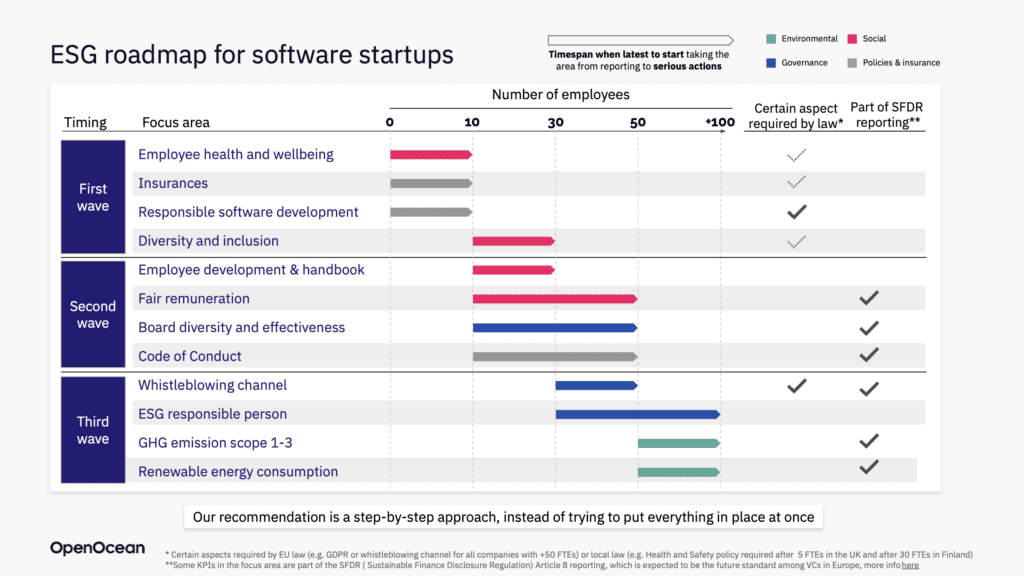
The ESG topic has been making headlines lately, and you might be hearing recommendations to start with ESG early. In my previous article, I mentioned why one should look at ESG and that it will also come up with investors, banks, and talent. But getting started without any prior experience can feel daunting. Let’s take a look at how the Finnish startups Kausal and Workfellow started, and how this simple ESG tool can help you as well.
There seem to be many misconceptions about implementing ESG. For example, founders often think that starting with ESG requires some emissions tracking, which sounds complex, time-consuming, and thus discouraging. Instead, it’s usually enough, to begin with basics like how you work and treat people already, what kind of suppliers you use, and develop a roadmap on how to evolve and what to improve.
Startups are not expected to be perfect with ESG
According to Oscar Löfqvist from the Finnish early-stage VC OpenOcean, when starting with ESG, you don’t have to reinvent the bicycle and do everything at once. You begin with ESG aspects that apply to your daily work, how you operate, and how your employees are doing; focus on what’s important for employees within the company, as we learn from the examples of Kausal‘s remote-first approach or Workfellow’s focus on diversity. Later, during the investment process, Oscar reassures the founders they actively work with the startup to understand current ESG and how to move forward together.
“There’s no need to have everything perfect right away. Implementing ESG aspects is a journey that needs to evolve with the company.“
Oscar Löfqvist, Investment Member at OpenOcean
“The starter pack was initially created for our portfolio companies, but as we have a long background in open source, it came naturally to make it available for everyone. There’s no need to have everything perfect right away. Implementing ESG aspects is a journey that needs to evolve with the company. Understanding expectations from employees, customers, and investors at different stages of your company, having a concrete action plan, and continuously improving is crucial to succeeding with ESG and creating a powerful snowball effect. And when it comes to investor expectations, generally, for startups with fewer than 100 employees, investors are comfortable with in-house tools or third-party software tools, and later on, a consultant typically steps in.” Oscar Löfqvist, Investment Member at OpenOcean describes.

Case examples: How Kausal and Workfellow implemented ESG in their operations
Finnish startup Kausal, which provides cities with SaaS for climate plans, has participated in FiBAN’s New Nordic Leads program and raised an angel round through FiBAN in 2021. The ESG topic came up again when raising their latest funding round. The team was glad they took initial steps not to get any delays in their fundraising process.
“From day one, we wanted to be aware of our activities and pay attention to any externalities; for instance, deciding on a remote-first policy. Doing ESG right requires a holistic approach. The fact that we started early came in handy during our fundraising, but we needed to be systematic to get it done. In the end, it was not just VCs and banks expecting us to have basics covered, but our customers and employees as well“, Sonja-Maria Ignatius, founder & CEO of Kausal says.
While there are many online resources to get started, such as articles, videos, and webinars, for example, by HBR, Slush, 500 Global, and the recently launched Balderton Capital page, it can quickly become overwhelming. Similarly to Kausal, the Finnish startup Workfellow – process analysis and operational excellence platform – utilized OpenOcean’s ESG Starter Pack. The ESG starter pack is a guide with a set of documents released last year to help early-stage software companies on their ESG journey while being regulation-compliant. Especially, the roadmap slide worked as a great starting point, highlighting what early-stage startups should implement at specific stages of their journey.
“Some aspects of ESG, like the importance of a diverse team, were already in place before the first funding round, as it was a priority to the founding team. After securing funding, we decided to select an ESG-responsible person and use the Starter Pack to build and keep evolving our ESG efforts – the visual aspect of it and step-by-step guidelines were especially a great help. We are continuously expanding on the topic today, and some current initiatives include creating our Code of Conduct, DE&I, and Sustainability Policies, which will be available on our website”, Marina Lange, People & Culture Lead at Workfellow describes.
About the author
Tomas Novotny was the founder and CEO of indoor environmental analytics company 720 Degrees, where he raised several funding rounds; the company was acquired recently. Currently, he is a FiBAN member and an advisor to several startups, including climate tool Kausal, property configuration platform Propster, and 1455AI, an AI tool that also assisted with the article; and a mentor and advisor to founders and investors at FiBAN, Pi Labs, and Courage Ventures.


